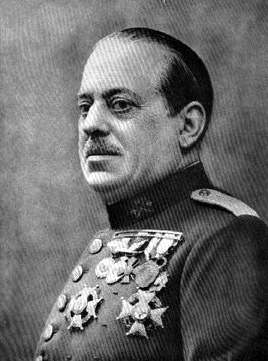<Back to Index>
- Botanist and Anatomist Frederik Ruysch, 1638
- Painter Cuno Amiet, 1868
- General of the Spanish Army Jose Sanjurjo y Sacanell, 1872
PAGE SPONSOR

General José Sanjurjo y Sacanell, 1st Marquis of the Rif (March 28, 1872 – July 20, 1936) was a General in the Spanish Army who was one of the chief conspirators in the military uprising that led to the Spanish Civil War.
Sanjurjo was born in Pamplona. His father, Captain Justo Sanjurjo Bonrostra, was a Carlist. His mother was Carlota Sacanell Desojo. He served in Cuba in 1896, in the Rif War (1909) in Morocco, and in the Rif War (1920), including the reconquest of lost territory in Melilla after the Battle of Annual in 1921. In 1922, he was assigned to investigate corruption in the army command of Larache. He was High Commissioner of Spain in Morocco and reached the rank of lieutenant general. In 1925 he participated in the amphibious landing at Alhucemas. With the completion of the 1920 Rif War, King Alfonso XIII awarded him the Gran Cruz de Carlos III on March 28, 1931. In 1928 he was made chief of a main directorate of the Civil Guard.
After the elections of April 1931, the Second Spanish Republic was proclaimed. Sanjurjo accepted the creation of the Republic: as a commander in the Civil Guard, his influence was a key factor. Thus he became the first general appointed to army command by the Revolutionary Committee of the Republic. However, Sanjurjo was known to be a monarchist.
Sanjurjo clashed with Prime Minister Manuel Azaña over military policy and was replaced by General Miguel Cabanellas. He was demoted by Azaña to chief of the customs officers in 1932 because of the events of Castilblanco and Arnedo. This confrontation with the ministry, and Azaña's military reforms, and grants of regional autonomy to Catalonia and the Basque Country, led him to plot a rebellion with some Carlists of Fal Conde, the conde de Rodezno, and other military officers. This rebellion, which was known as the sanjurjada, was proclaimed in Seville on August 10, 1932. Sanjurjo asserted that the rebellion was only against the current ministry and not against the Republic. It achieved initial success in Seville but absolute failure in Madrid. Sanjurjo tried to flee to Portugal, but in Huelva he decided to give himself up.
He
was condemned to death, a sentence which was later commuted to life
imprisonment in the penitentiary of the Dueso. In March 1934 he was
granted amnesty by the Lerroux government and went into exile in Estoril, Portugal. When on May 10, 1936, Niceto Alcalá - Zamora was replaced as President of the Republic by Azaña, Sanjurjo joined with Generals Emilio Mola, Francisco Franco and Gonzalo Queipo de Llano in
a plot to overthrow the leftist Popular Front government. This led to
the Nationalist uprising on July 17, 1936, which started the Spanish
Civil War. Sanjurjo
died in Estoril in a plane crash on July 20, 1936, when he tried to fly
back to Spain. He chose to fly in a small airplane piloted by Juan Antonio Ansaldo.
One of the main reasons for the crash was the heavy luggage that
Sanjurjo insisted on bringing. Ansaldo warned him that the load was too
heavy, but Sanjurjo answered him: Ironically,
Sanjurjo chose to fly in Ansaldo's plane rather than a much larger and
more suitable airplane that was available. It was an 8 - passenger de Havilland Dragon Rapide, the same one which had transported Franco from the Canary Islands to Morocco. Sanjurjo apparently preferred the drama of flying with a "daring aviator". (Ansaldo survived the crash.) Sanjurjo did not trust Franco very much saying: "With or without Frankie - boy we will go ahead to rescue Spain!" When
Mola also died in an aircraft accident, Franco was left as the
effective leader of the Nationalist cause. This led to rumors that
Franco had arranged the deaths of his two rivals, but no evidence has
been produced to support this allegation.
The opening of the alternate history fiction writer Harry Turtledove's novel Hitler's War in his series The War That Came Early begins with Sanjurjo's flight from Portugal. The point of divergence is
that he accepts the pilot's advice and abandons the luggage, the flight
no longer being overloaded and thus arriving safely. His behaviour from
that point on is described as if he diverged from that of the actual
Franco, with Spain taking a less isolated role in World War II.